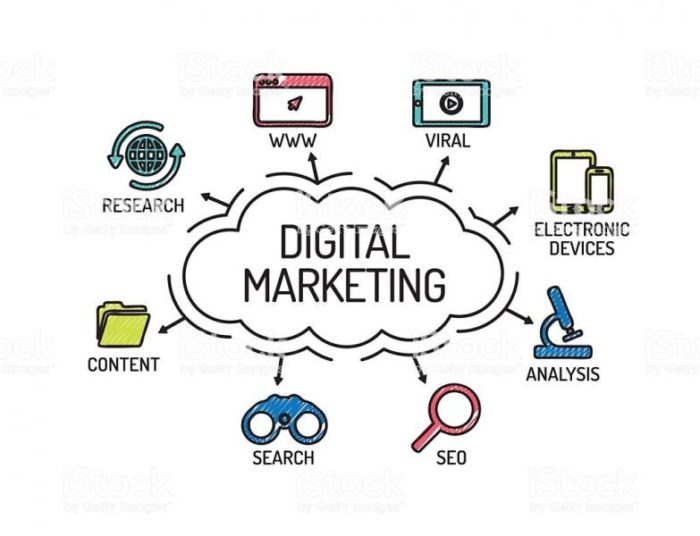DIGITAL MARKETING
Learn the fundamentals of digital marketing, and help grow your business or career.
- Grow the online presence of a business or organization from scratch
- Creating appealing content for marketing purposes
- Ways to make money from Digital Marketing
- Computer Basics

1. The online opportunity
Today’s world is a digital one, with nearly half of the global population online. With so many people using the internet, it makes sense for a business to tap into digital. Find out what opportunities exist and how a website, videos or social media could help you reach your goals.
2. Your first steps in online success
There are many ways to promote a business online. But before you can get started, you should familiarise yourself with how these digital channels work, which options are best suited to you, and how to set up a clear plan or strategy that will help you achieve your goals and assess your results.
3. Build your web presence
From websites to local listings, mobile apps to social media, there are lots of ways to be found online. If a website is the best fit for your goals, you’ll need to have a basic grasp of how they work. Even more importantly, having design and usability best practices under your belt will help you build a website that tells your story well, and allow your customers to find what they need.
4. Plan your online business strategy
From identifying your goals to knowing how to track your progress, this topic will show you how to put your best foot forward when creating a digital business strategy. Learn how to stand apart from the competition and how to impress customers at every point of their experience.
5. Get started with search
Search engines make it simple to find what you’re looking for with a click of a button. But how do they work, and how can you improve your visibility on them? Learn the difference between organic and paid search results and why advertising on search engines is so effective.
6. Get discovered with search
Search Engine Optimisation might sound like a mouthful, but once you understand how search engines work you’ll be on your way to becoming SEO confident. Learn how to develop an adaptable SEO plan, identify the most effective keywords, and which tools can help you measure what matters.
7. Make search work for you
Optimising web pages correctly means more people can find your content faster. There are lots of ways to achieve this, so choosing the most effective methods will save you time and resources. In this topic you’ll learn how to master meta tags, backlinks, international SEO and more.
8. Be noticed with search ads
Search Engine Marketing (SEM) can open up a world of opportunities when it comes to promoting your service or product. By specifically targeting people interested in your website, you can use online advertising to directly connect with future customers. Learn how an SEM auction works and which elements are important to master so you can create ads that stand out from the crowd.
9. Improve your search campaigns
The world of Search Engine Marketing (SEM) is full of opportunities, but to benefit you’ll first need to master research tools and keyword selection. From there, you can improve and optimise your search campaigns to ensure you get maximum value for what you spend.
10. Get noticed locally
If you have a physical storefront, you’ll need to harness local online marketing in order to reach customers. Ensure you’re visible to people close to your store by creating a listing in local directories, engaging in mobile marketing and building a local search presence.
11. Help people nearby find you online
Thanks to search engines, local directories and social networks, reaching customers who are physically close to a store is a relatively easy task. Learn some ways to take advantage of that unique opportunity to attract new customers, by mastering local advertising, mobile marketing and more.
12. Get noticed with social media
Everyone’s on social media, so it makes sense for your business to be there too. Take advantage of popular social media networks by understanding why you need to be there, joining the right social media sites and growing your presence by engaging with your networks.
13. Discover the possibilities of mobile
Web browsing on-the-go is very much a part of everyday life – which is why a mobile presence is important for businesses to embrace. Learn about mobile SEO. the differences between mobile sites and mobile apps, and which type of mobile marketing is right for your goals.
14. Make mobile work for you
With mobile video consumption on the rise, it makes sense to include mobile in your advertising strategy. Understanding the options and tools available and how to choose the right keywords and ad formats will set you up to succeed in your first mobile marketing campaign.
15. Get started with content marketing
Content marketing is a great way to build trust and increase site traffic. In this topic, you’ll learn how to write for online audiences, organise production and promotion, choose the right format based on your content, and track your content marketing success.
16. Connect through email
Email marketing is a great way to connect and stay in touch with your customers. From building a contact list to learning how to design emails that really stand out, this topic will teach you the basics of effective email marketing campaigns.
17. Advertise on other websites
By incorporating a mix of both display and search engine advertising, you’ll be able to maximise your online visibility. Learn about the benefits of display and search ads, how they differ and how to find and target the right audience, so that you have the skills to correctly structure your ad campaigns.
18. Deep dive into display advertising
To make display ads succeed, it is important to first understand how advertising networks connect businesses who want to advertise, with websites with ad space to sell. You can then harness the power of retargeting solutions to stay top of mind and really move potential customers through the sales funnel.
19. Make the most of video
Today, video is a vibrant and popular part of the online experience. Connecting with customers through this versatile medium can open up valuable advertising and content marketing opportunities. Learn how to integrate video into your online strategy, plan and produce videos on a budget, and promote them so that they’re seen by the right people.
20. Get started with analytics
Web analytics can provide a world of information when it comes to understanding your web users. By clearly outlining your business goals, you can then utilise analytics data to help you refine and improve your website and meet your objectives.
DURATION: 30 minutes
21. Find success with analytics
Analytics tools provide loads of data, but they don’t always give easy answers. Dive a little deeper into web analytics, and you’ll soon be able to measure organic search analytics, understand SEM data and master segmentation techniques.
22. Turn data into insights
Knowing how to turn digital data into actionable insights can improve your online campaign results and help you meet your goals. In this topic, you’ll learn about the data cycle, how to draw actionable insights from raw data, and which tools can help you manage digital data efficiently. We’ll also cover how to present information in a way that will make the most impact with a target audience.
23. Build your online shop
Tap into the world of e-commerce and learn how to effectively sell your products online. From the tools you’ll need to build your online shop from scratch, to payment methods and managing orders, this introductory topic will get you on your way.
24. Sell more online
Once your online shop is set up, it’s time to ensure everything is optimised correctly so that customers have the smoothest user experience possible. Each touchpoint is an important communication opportunity between you and your customers: from signing in and browsing to checking out and receiving promotions about sales.
25. Expand internationally
Ready to dive into the global market? Before launching products or services to an international audience, it’s important to validate your new markets, know the difference between translation and localisation and ensure you have the technical infrastructure to manage it all. Once you have a solid set-up, consider advertising across borders so that your marketing messages are seen by the right people, wherever they are.
